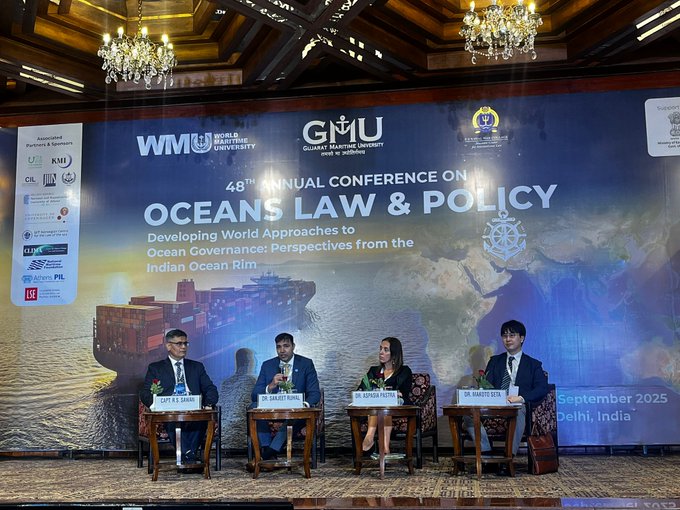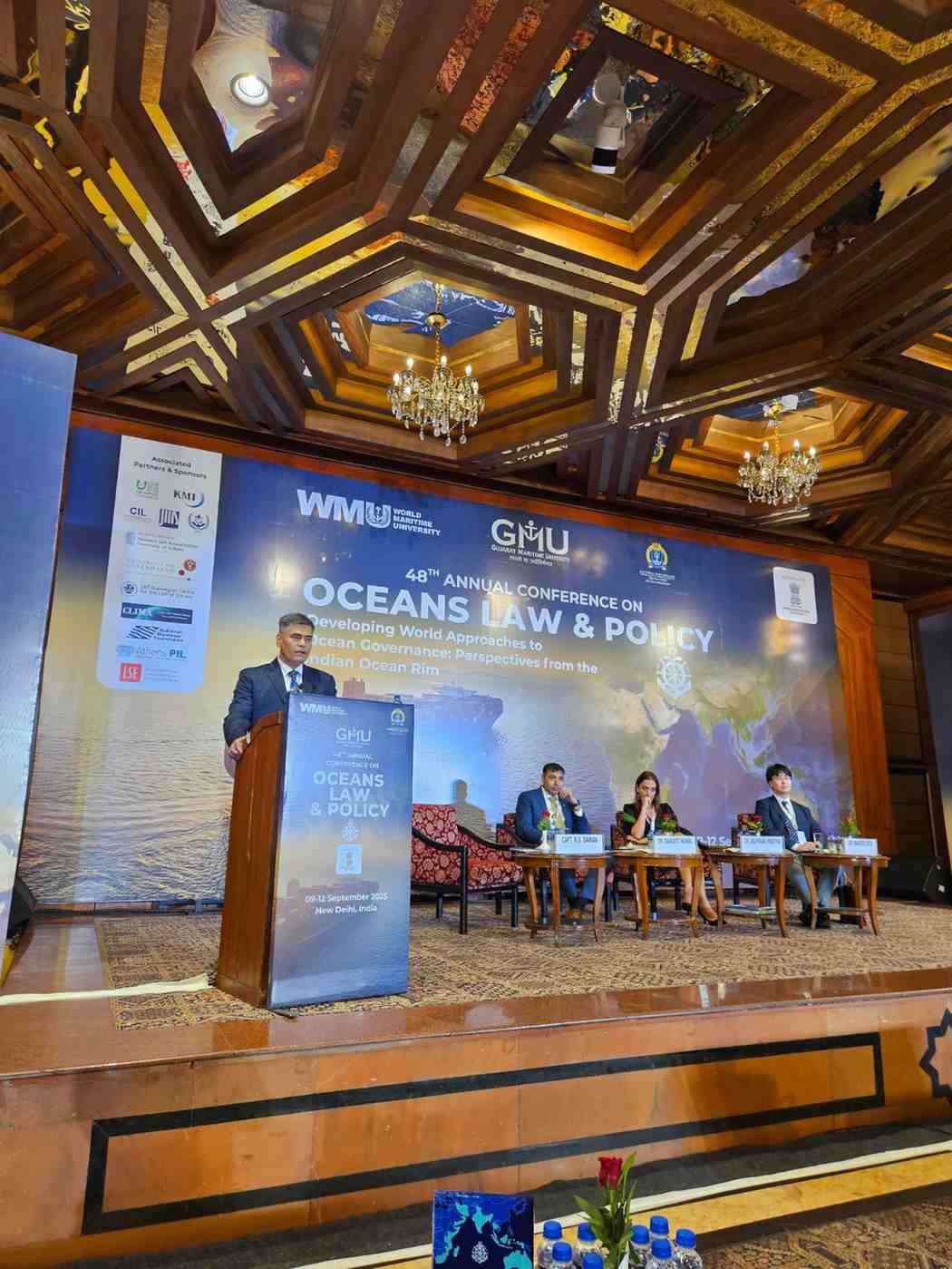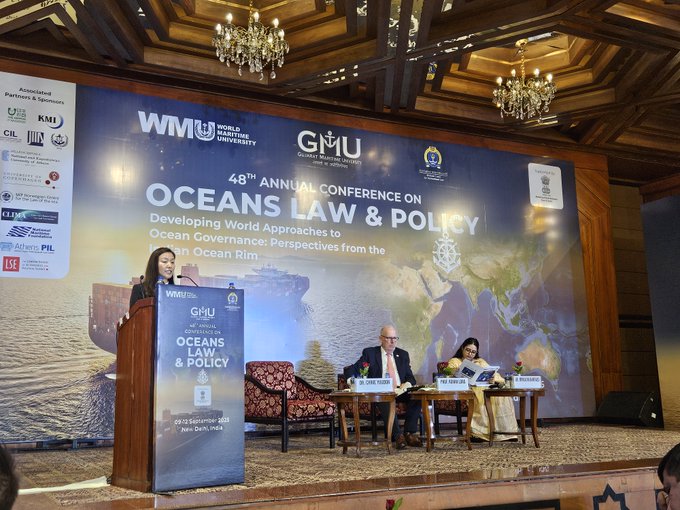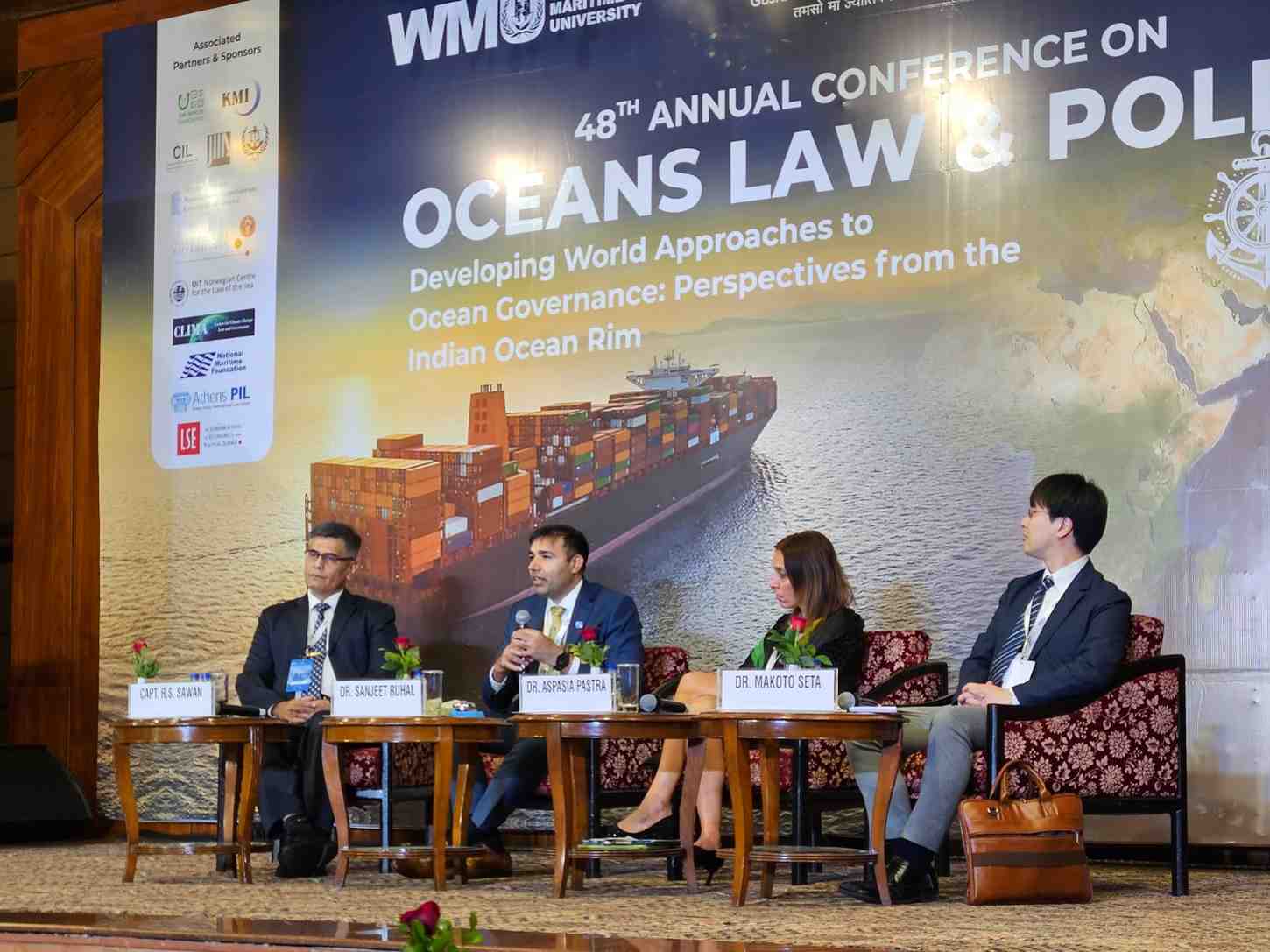
COLP48 Day 1: Global Experts address Triple Planetary Crisis and Ocean Infrastructure Vulnerabilities
International Judges, Diplomats, and Scholars Examine Urgent Challenges Facing Indian Ocean Region
NEW DELHI : The 48th Annual Conference on Oceans Law & Policy (COLP48) entered its first day of technical deliberations on Wednesday at The Ashok Hotel, New Delhi. Hosted by Gujarat Maritime University (GMU), the academic sessions brought together international judges, diplomats, scholars, and young researchers to explore urgent challenges facing the Indian Ocean region under the conference theme “Developing World Approaches to Ocean Governance: Perspectives from the Indian Ocean Rim.“



Opening Keynote and Context Setting
The day commenced with introductory remarks from Prof. Dr. Manoj Kumar Sinha, President, Indian Society of International Law, who provided historical context by recalling Arvid Pardo’s historic 1967 UN speech, noting that many of the same concerns—peace at sea, prevention of pollution, and protection of ocean resources—remain pressing yesterday.
Prof. Sinha traced the evolution of the law of the sea, from the 1958 Geneva Conventions and the 1971 seabed declaration to the landmark adoption of UNCLOS in 1982 after a decade of negotiations. He emphasized India’s strong commitment to implementing UNCLOS and its engagement with the recent Biodiversity Beyond National Jurisdiction (BBNJ) treaty.
Highlighting the developing world’s perspective, he underscored the BBNJ’s focus on establishing a just and equitable international economic order, South-South cooperation, and technology transfer. He stressed key principles including the polluter-pays rule, precautionary approach, equity, and the common heritage of mankind, which align with Indian judicial practice. Looking ahead, he urged greater investment in knowledge capital and academic capacity building in maritime law, covering areas such as seabed mining, marine technology, and artificial intelligence applications.
Judicial Perspective on BBNJ Agreement
Judge Neeru Chadha, Vice President of the International Tribunal for the Law of the Sea, delivered a keynote address virtually, reflecting on the significance of the recently adopted BBNJ Agreement. “The adoption of the BBNJ Agreement is a reminder that law must keep pace with science and global challenges. Forums like COLP help us interpret and implement these changes in ways that matter for people and nations,” she observed.
Triple Planetary Crisis Takes Centre Stage
The first plenary session focused on the triple planetary crisis of climate change, biodiversity loss, and marine pollution, setting the stage for wide-ranging discussions. A notable insight emerged from the deliberations: “The idea of a Blue Economy is not enough, we must now think in terms of Blue Resilience,” highlighting the need to adapt to rapidly changing oceanic realities
Critical Ocean Infrastructure Vulnerabilities Exposed
The session on Interests & Infrastructure in the Indian Ocean underscored growing vulnerabilities of critical ocean infrastructure, both visible and invisible:
Undersea Cable Security: Tomoyuki Yoshida highlighted the critical dependence of global communications on undersea cables, which carry 98% of internet traffic, and warned of increasing disruptions citing cases in Finland and Taiwan. He called for stronger domestic laws, a global convention against sabotage, and enhanced surveillance and resilience measures.
Energy Pipeline Protection: Jeonghee Lim addressed parallel risks to undersea cables and energy pipelines, noting the rise of “grey zone” strategies and hybrid threats. He urged greater international cooperation, legal development, and crisis preparedness to address these emerging security challenges.
Vessel Traffic Management: Sonali Mukherjee focused on Vessel Traffic Management Systems (VTMS), stressing their crucial role in navigation safety, accident prevention, and sustainability. She identified challenges including cyber risks, outdated technology, and skill shortages, advocating for modernization, AI integration, and enhanced global cooperation to secure India’s maritime domain.
International Trade and Shipping: Legal and Environmental Dimensions
The session on International Trade & Shipping brought together diverse perspectives on legal, scientific, and environmental aspects of ocean governance:
Legal Framework Foundation: Dr. James J. Nedumpara outlined the international legal framework, emphasizing UNCLOS as the foundation for agreements like BBNJ and fisheries subsidies.
He highlighted India’s perspective on challenges including IUU (Illegal, Unreported and Unregulated) fishing, marine pollution, and habitat loss, noting that sustainable ocean use requires balancing livelihood subsidies with conservation imperatives.
Marine Scientific Equipment Regulation: Dr. Eka Higuchi examined marine scientific facilities and equipment under the law of the sea, referencing recent Japanese cases involving buoys deployed in sensitive waters. She clarified how UNCLOS Articles 258-262 govern scientific installations, while noting legal and operational gaps in classification and regulation.
Shipping and Climate Nexus: Dr. Beatriz Martinez Romero focused on the intersection of shipping and climate change, underlining that shipping accounts for approximately 3% of global greenhouse gas emissions. She reviewed the IMO’s revised 2023 decarbonization strategy aiming for net zero emissions by mid-century. Drawing on ITLOS and ICJ advisory opinions, she stressed that marine GHG emissions constitute pollution, framing states’ obligations under international law and warning that weak shipping regulations could incur state responsibility.
Regional Cooperation and Strategic Balance
The day concluded with a keynote address by Charlie Garnjana-Goonchorn, Director of Legal Affairs, Ministry of Foreign Affairs of Thailand, who synthesized the day’s debates. “The Indian Ocean is not only a strategic space, but also a community of nations. It is through cooperation that we can balance security, development, and sustainability,” he emphasized.
Looking Ahead
With its combination of high-level insights and forward-looking debates, Day One of COLP48 highlighted the urgency of collective action in addressing ocean governance challenges. The sessions underscored the need for enhanced international cooperation, technological innovation, and adaptive governance frameworks to address the complex challenges facing the Indian Ocean region.
The conference continues on September 11 with additional technical sessions covering maritime boundaries, dispute settlement, and future ocean governance frameworks, culminating in a valedictory address by Hon’ble Minister Shri Sarbananda Sonowal, Ministry of Ports, Shipping and Waterways, Government of India.

